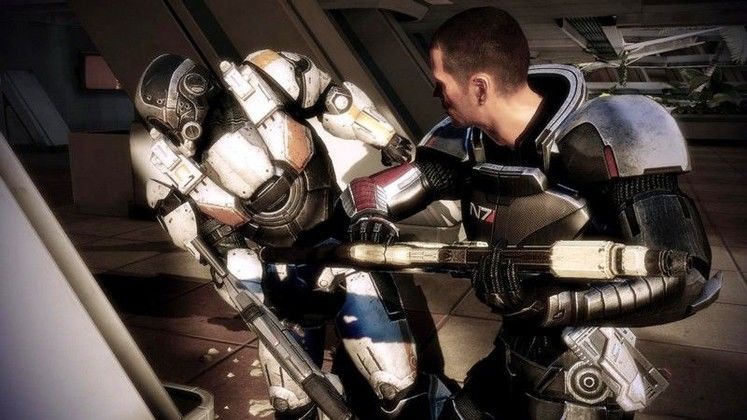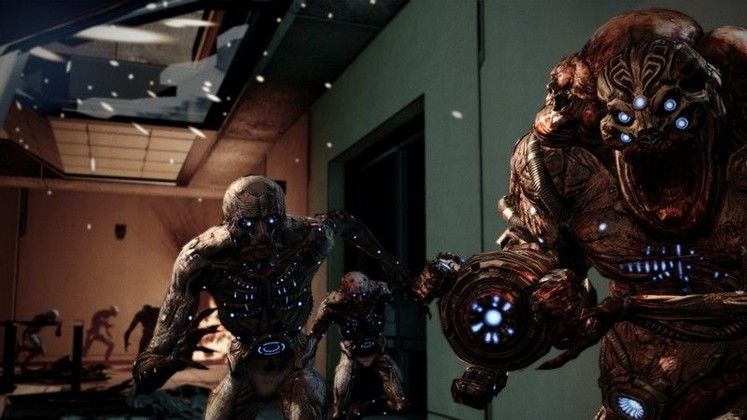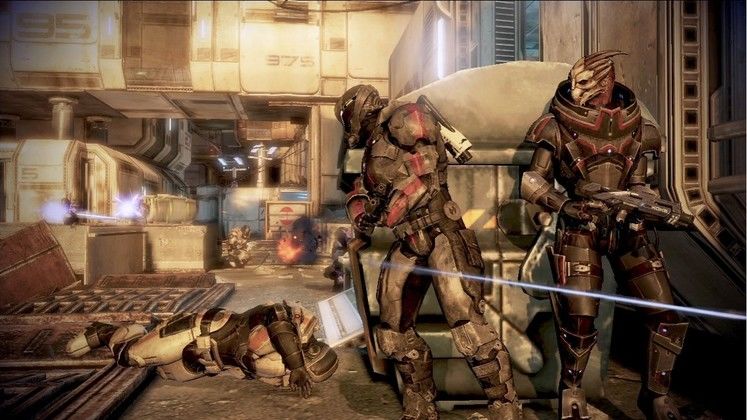 |
| Oddly enough, melee isn't as good as it's made out to be... |
In terms of the core make-up off the game, we’d say it’s a kind of half-way house between Mass Effect and the second game. In the previous instalment, Bioware stripped out and streamlined a lot of more traditional RPG features, and some believed they had gone a bit too far – now they’ve swung things back in the opposite direction, but not too much as to be too old-school. You can now mod your main weapons in a limited capacity, each variation of each weapon had different stats, so it becomes a choice of which weapons you want to bring… hell they’ve even got a weight system now that means that if you do want to bring all give with you, you could five serious penalties on your combat powers. And that’s just with the guns – they have been other tweaks and changes, from how exploration is dealt with in the game, to movement in combat, to squad interactions.
As with all Mass Effect games, sometimes it seems as if you do as much talking as you do fighting. Combat is great – a little stiff at times, and slightly difficult to master – and the afore mentioned tweaks really give everything a more seamless (Or Gears-like, if you want to draw comparisons) experience. The enemies are tough AND smart too, forcing you to use your squad and powers more effectively to combat different situations and enemies. When you’re not blowing a Reaper’s guts all over the wall though, you’re dealing with character interaction, and here is where we encounter some more oddities. Now, we’re willing to concede that a lot of this is probably down to the fact that Bioware has to reconcile possibly events and outcomes strewn across three games, but it doesn’t make the experience any less jarring sometimes.
 |
| Local residents in Staines weren't happy about the Day One DLC |
That said, the reason why the ‘playable’ cast is smaller this time is to allow for deeper character relationships – and that, at least, is clear. In the fact the entire plot – from the emotional side of things at least (the core story has its good and bad points) - is very well written. Heart strings will be pulled and made to dance like puppets. It’s not as obvious playing the game through normally (although you do get an odd sense of paranoia when it comes to making decisions), but If you dig deeper into the possible outcomes for the game – by consulting a guide or a wiki or whatever – you really do come to appreciate the big picture Bioware had to work with. At the very least, the studio and this game deserve credit for that. Now if only they had given Legion more screen time…
Of course, we must also talk about the multiplayer as well, given how integral it’s become to the game. In short – it’s actually not bad. Sure, it’s basically Horde mode with Mass Effect themes, but you can tell Bioware have at least given it a good effort – the character you take into ‘Galaxy at War’ (official name for the MP) can be customised, race, sex, class, and then you can customise looks as well. From there, you fight in matches (Bronze, Silver or Gold ‘difficulties’), and you gain XP and credits to level up and buy ‘kits’ from the in-game store that net you random loot. This loot can be anything from Medi-Gel, to one-off boosters, to weapon and armour ‘mods’ that can be applied for a particular mission. You have fewer powers than Shepard, but you still level them up in the same way, you can swap out and level up a different character class as an when you please.
The reality though, as far as we’ve been able to tell at the time of writing, the only real use ‘Galaxy at War’ has is to augment the single-player. Whilst the general plot of ME3 has you trying to rally the galaxy to fight back against the reapers, in gameplay terms this essentially has you collecting ‘War Assets’. The exploration element of the game manifest itself here, with you travelling into Reaper controlled territory to ‘rescue’ people and assets, and along with the odd salvage find to net you fuel and credits. These assets contribute to a global asset metre, but the value is modified by ‘Galactic Readiness’, which starts off at 50% (so you basically need to work harder to get the minimum amount of assets you need). Play multiplayer however, and that modifier increases, and your assets are worth more… until you get to 100%. After you reach that, we don’t really see the multiplayer having any draw since it’s not competitive and there’s little else to do with it.
 |
| You have to unlock other species in multiplayer, so to begin with you'll be playing as faceless human operatives. |
This review isn’t really about how ‘good’ Mass Effect 3 is – of course it’s good. Great, even, but I feel my job is just as much about managing expectations as it is recommendations. Is this the best game of the series? It’s hard to tell – Mass Effect 2 was a better stand-alone game we feel, but there are elements of ME3’s core make-up that are also superior to any of the previous games. Multiplayer is a good start, but really could do with something competitive, and whilst the central story is emotionally rich (with some epic set-pieces), it does spend a little bit too much time tying up everything from all three games. Ultimately though, we think that this is as good an ending to the trilogy as you’re going to get, and Bioware deserve a round of applause for creating such a grand and visionary series.
There are certain set-pieces that… no, damn it… I promised myself I wouldn’t cry…
Xbox 360
Note: Sadly, I do not own the Kinect 360 peripheral, so was unable to test out those features on the Xbox 360 version.
MASS EFFECT 3 VERDICT
Played on:
TOP GAME MOMENT
There are certain set-pieces that… no, damn it… I promised myself I wouldn’t cry…




